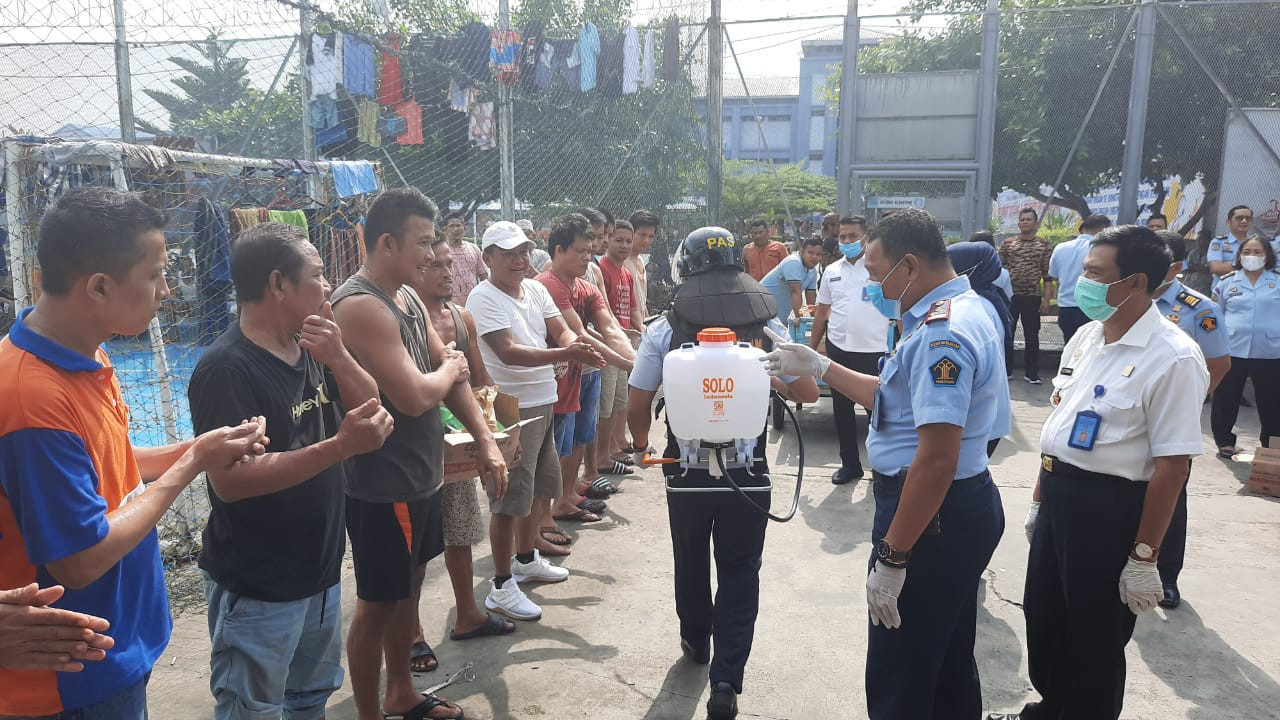Popular Reads
Top Results
Can't find what you're looking for?
View all search resultsPopular Reads
Top Results
Can't find what you're looking for?
View all search resultsSuspicions emerge over government’s plan to grant inmates early release
According to data from antigraft watchdog Indonesia Corruption Watch (ICW), many political figures stand to benefit from the early release plan, including former Golkar Party chairman Setya Novanto and former United Development Party (PPP) chairman Suryadharma Ali.
Change text size
Gift Premium Articles
to Anyone
T
he government is facing scrutiny over its plan to grant inmates early release as part of its efforts to prevent the spread of COVID-19 in overcrowded correctional facilities, with some alleging a proposal to free graft convicts is motivated by ulterior political interests.
A plan to release inmates, including graft convicts, was first brought up by Law and Human Rights Minister Yasonna Laoly in a virtual meeting with the House of Representatives’ Commission III overseeing legal affairs last week. He said overcrowding in prisons could worsen the spread of COVID-19 and suggested that 50,000 inmates should be released to mitigate contagion.
Yasonna, an Indonesian Democratic Party of Struggle (PDI-P) politician, said the 50,000 inmates eligible for early release included some 15,442 drug convicts who had served five to 10 years in prison, 300 graft inmates aged 60 years and above, 1,457 special crime convicts with chronic diseases and 53 foreign prisoners who had served two-thirds of their sentences.
To support the plan, Yasonna said the government had considered relaxing a 2012 government regulation that stipulates strict requirements be met when considering granting remissions and parole for those convicted of extraordinary crimes, including corruption.
Yasonna’s plan was immediately met with criticism from analysts and antigraft activists, who suspected it would enable prominent figures from political parties now serving time in prison to return to the political stage.
The executive director of the Indonesian Political Review (IPR) Ujang Komarudin said these figures were still valuable to their respective parties because of their influence, connections, financial resources and negotiating power.
“As a simple example, they can exert their influence when controversial bills are set to be deliberated by the House,” Ujang told The Jakarta Post on Monday. “So, is the plan really focused on halting the spread of the disease? I think not. I sense there is a strong political agenda.”
According to data from antigraft watchdog Indonesia Corruption Watch (ICW), many political figures stand to benefit from the early release plan, including former Golkar Party chairman Setya Novanto and former United Development Party (PPP) chairman Suryadharma Ali.
Other potential names include former Riau governor Rusli Zainal of Golkar and former Papua governor Barnabas Suebu, who was also a former NasDem Party member.
Ujang also accused the government of misusing its power to accommodate the interests of other political parties allied with the PDI-P, noting that the ruling party was supported by six of the nine parties in the House.
“Bear in mind that the law minister is a member of the ruling party. As a politician, he will likely follow the party line,” he said.
Donal Fariz of the ICW said the plan was another sign that political powers within Joko “Jokowi” Widodo’s administration had been looking to undermine the country’s anticorruption campaign ever since Jokowi’s began his second term in October.
Last year, Jokowi’s administration was condemned for allowing a contentious amendment to the Corruption Eradication Commission (KPK) Law to pass. It contains long-disputed articles that observers and antigraft activists said would defang the KPK, currently the most powerful corruption-fighting body in the country.
“Looking at the government’s past moves, it’s evident that COVID-19 is merely a justification for the ruling powers to allow early release [of graft convicts],” Donal said.
PDI-P lawmaker Heri Herman denied the accusations, saying that Yasonna’s plan was a manifestation of the government’s “humane” approach to the pandemic.
“We believe the government should put humanity first in times of crisis; That’s why we support the idea [of releasing inmates],” Heri told the Post.
“During his recent [virtual] meeting with the lawmakers, the minister made clear that inmates would be required to have fulfilled two-thirds of their sentences and be above 60 years of age. So, it’s not just about graft convicts,” he said.
Taufik Basari, a NasDem lawmaker, concurred with Heri, saying that the government needed to step up its effort to contain the virus. “I believe the plan [of releasing convicts] is aimed only at saving lives, as we are now in a state of emergency.”
The Prosperous Justice Party (PKS), however, has voiced opposition to the plan, with party spokesperson Ahmad Fathul Bari arguing that corruption was an extraordinary crime, which often resulted in intolerable state losses.
The PKS, he said, suspected there was an ulterior motive behind the plan. “In a nutshell, we oppose the idea of releasing graft convicts, even if it’s based on humanitarian considerations.”
Jokowi, however, was quick to clarify the government’s stance on Monday, saying it had no intention to release graft convicts, who are categorized as special crime inmates. He said the government’s plan would only include inmates incarcerated for general criminal offenses.
“I want to say that we have never talked about graft prisoners in our meetings,” the President said in a Cabinet meeting on Monday.
-- Marchio Irfan Gorbiano contributed to this story










